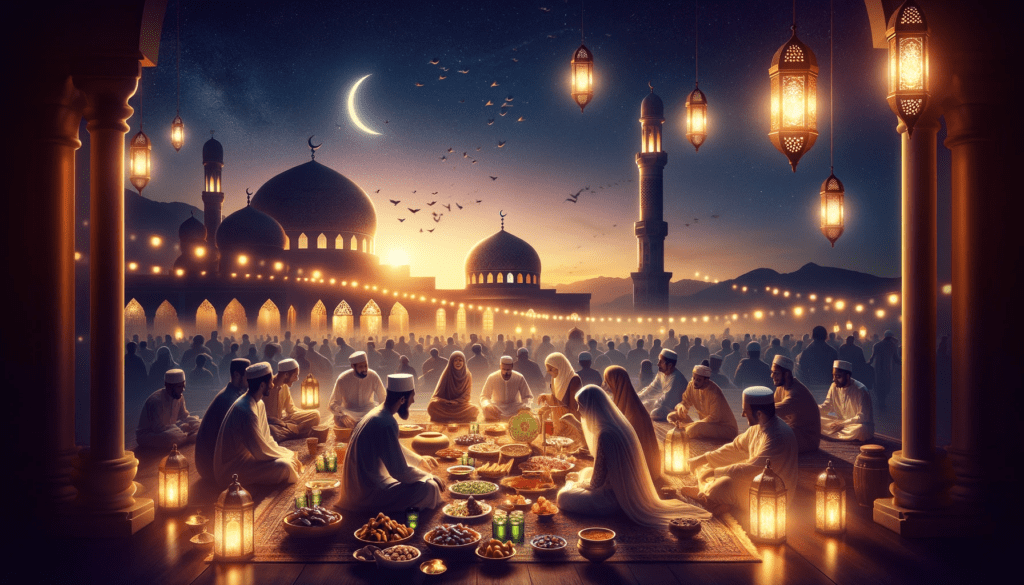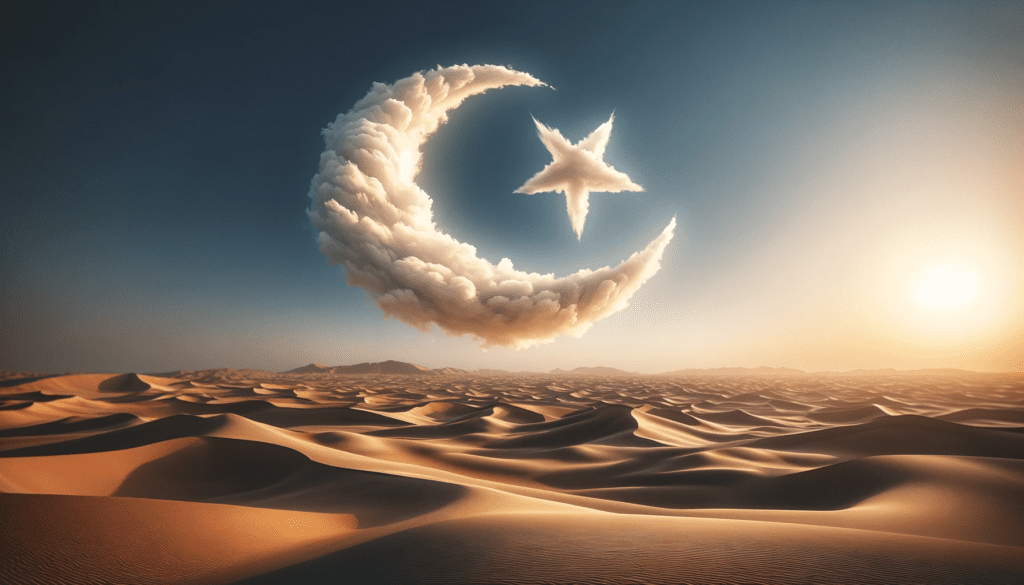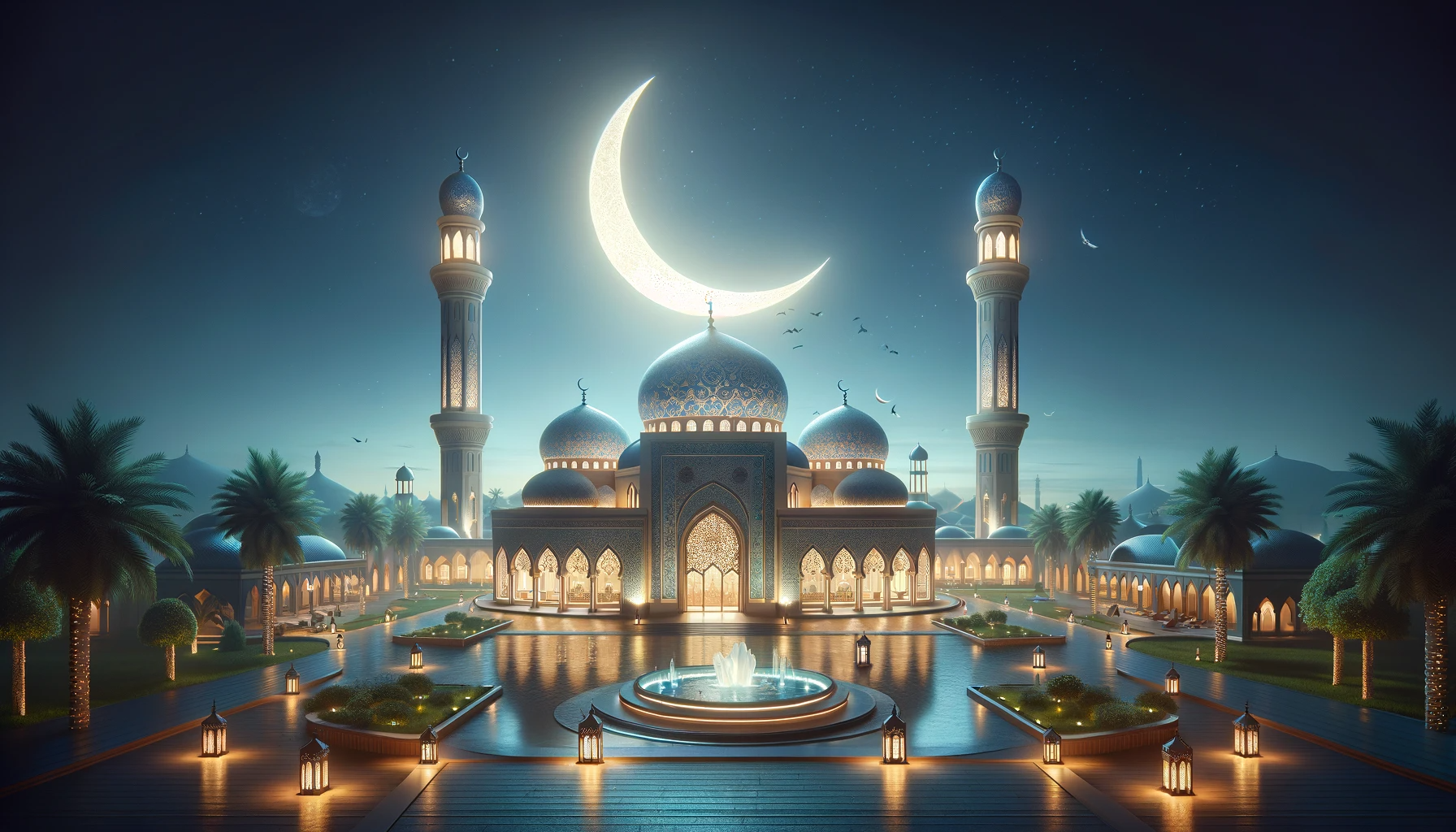Ramadan is the ninth month of the Islamic calendar and observed by Muslims worldwide as a month of fasting. It lasts either 29 or 30 days based on the sighing of the cresent moon. Muslims have to refrain from consuming food, drinking liquids, smoking and sexual relations. In some interpretations also from swearing. Eid al Fitr marks the End of Ramadan.
- Arabic: رمضان Ramaḍān, IPA: [rɑmɑˈdˤɑːn];
- Persian: Ramazān, Ramezũn;
- Urdu: Ramzān; Turkish: Ramazan)
When is Ramadan 2025
- 2025 Ramadan will start on Friday, 28th of Februar and will end on Saturday, 29th of March 2025
When is Ramadan 2026
- 2026 Ramadan will start on Tuesday, 17th of Februar and will end on Thursday, 19th of March 2026
Recent dates for Ramadan
- 2024 Ramadan started on Sunday, 9th of March and will end on Monday, 8th of April 2024
- Ramadan 2021 begann on Monday, 12th of April and ended on Wednesday, 12th of May 2021
- 2020 Ramadan began on Thursday, 23rd of April and ended on Saturday, 23rd of May 2020
- 2019 Ramadan ((Hijri 1441) began on Wednesday, the 6th of May 2019 and ended on Tuesday, the 4th of June 2019.

Please note that in the United States, Ramadan starts a day later.
Where does the word Ramadan comes from?
It comes from the Arabic root ramida or ar-ramad, which means scorching heat or dryness.
Ramadan, the ninth month of the Islamic lunar calendar, is considered one of the holiest months for Muslims worldwide. It is a time of fasting, reflection, prayer, and increased devotion to spiritual practices. While the basic observance of fasting from dawn to sunset is universal, the way Ramadan is celebrated can vary based on cultural and regional traditions.
Common Practices observed during Ramadan:
- Fasting (Sawm): Muslims abstain from food, drink, smoking, and intimate relations from dawn (Fajr) until sunset (Maghrib) every day throughout the month. This fasting is obligatory for all adult Muslims, with some exceptions (e.g., illness, pregnancy, travel).
- Suhoor and Iftar: The pre-dawn meal (Suhoor) is consumed before Fajr prayer, while the evening meal (Iftar) is consumed at sunset. These meals are often communal. Families and communities gather to break their fast together.
- Increased Acts of Worship: Muslims engage in additional prayers, recitation of the Quran, and other acts of worship during Ramadan. Many aim to complete the entire Quran during this month.
- Taraweeh Prayers: These are extra night prayers held at mosques during Ramadan. They are performed in congregation and are considered a highly recommended (Sunnah) practice.
- Charitable Acts (Sadaqah): Giving to the less fortunate and performing acts of charity are highly emphasized during Ramadan. Many Muslims increase their donations to various charitable causes and organizations.
- Spiritual Reflection and Repentance: Muslims use this month for introspection, seeking forgiveness for past sins, and making a renewed commitment to living a righteous life.
- Community Activities: Many communities organize special events, lectures, and religious classes to enhance spiritual growth and knowledge.
- Fasting Etiquette: Muslims are encouraged to be more patient, kind, and mindful of their behavior. This includes refraining from negative speech and actions.
- Special Foods and Drinks: Unique foods and beverages are prepared for Suhoor and Iftar. These vary by region and culture but often include traditional dishes and special Ramadan desserts.
- Family and Social Gatherings: Families and communities often come together to share meals and engage in religious activities. It’s a time for strengthening bonds and promoting unity.
- Eid Preparations: Towards the end of Ramadan, preparations for Eid al-Fitr, the festival that marks the end of fasting, begin. This may involve shopping for new clothes and gifts.
- Night of Decree (Laylat al-Qadr): This is a highly significant night during the last ten days of Ramadan, believed to be when the Quran was first revealed. Many Muslims engage in intense prayer and worship during this night.
It’s important to note that while these practices are common, the specific customs and traditions associated with Ramadan may vary from one country or region to another, influenced by local culture and traditions. Additionally, not all Muslims may observe Ramadan in exactly the same way, and individual practices may vary.
If you want to add some new creativity to traditional customs, you can design crafts about Ramadan as accessories, such as Pin Badges and other crafts. Add your own creativity and blessings or prayers, and design the pattern you like.
Not only is it a gift for family and community, but it is also a unique Ramadan souvenir. In terms of decoration creativity, custom neon signs can be used to embellish it. You can design
neon signs with holiday labels, or your favorite traditional cultural patterns and prayer slogans. Decorations are also great for enhancing the festive atmosphere at events or parties.
Previous Dates for Ramadan
- 2018 Ramadan started on Wednesday, the 16th of May 2018 and ended on Thursday, the 14th of June
- 2017 Ramadan started on Friday, the 26th of May 2017 (Hijri 1439) and ended on Sunday, the 25th
- 2016 Ramadan started on Monday, the 6th of June 2016 and ended on Tuesday, the 5th of July 2016
- 2015 Ramadan started on Thursday, the 18th of June 2015 and ended on Friday, the 17th of July 2015
- 2014 Ramadan started on Saturday, the 28th of June 2014 and ended on Sunday, the 27th of July
- 2013 Ramadan started on Tuesday, the 9th of July 2013 and ended on Wednesday, the 7th of August


